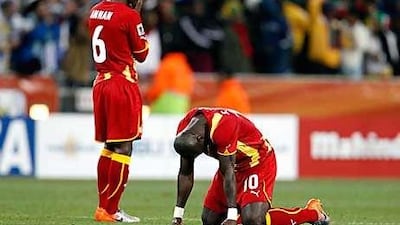How do you measure progress? In the case of Africa's first World Cup, the continent itself will cling to slender measures of how far it has moved forward on the field. An African team, Ghana, reached the quarter-finals, which had happened only twice before. An optimistic interpretation of what the Black Stars achieved would point out they came closer to a semi-final than any other side from the continent.
In 1990, Cameroon led England 2-1 with seven minutes left of their quarter-final; in extra-time England scored a third goal and were through. In 2002, Senegal lost to Turkey on the now defunct "golden goal", scored three minutes into extra time. In 2010 Ghana took Uruguay to a penalty shoot-out - to beyond 120 minutes - having been scandalously denied a 120th-minute goal by the Luis Suarez handball that Asamoah Gyan failed to punish when he struck the consequent spot-kick against the crossbar. A centimetre or so kept Ghana from the last four.
The bad news? Five other African teams fell at the first hurdle; it made Africa effectively the worst-performing continent, on its own soil. Asian football reached a new milestone with South Korea and Japan breaching the group stage for the first time in a World Cup outside their own territory; the United States and Mexico both reached the last 16 to uphold the pride of North and Central America. South America propelled all its five teams into the last 16, four into the last eight and one into the last four. Europe collected gold, silver and bronze and even Oceania passed through the tournament unbeaten.
Put brutally, little New Zealand ended up with three times as many points as either Nigeria or Algeria, and three points more than barren Cameroon. In the search for alibis for wretched showings by some of Africa's so-called heavyweights, Cameroon are left most vulnerable. Their football at times looked strong enough to win their games, but that momentum was barely sustained, they made bad errors to concede goals and were playing out their sad early exit against a background of in-fighting that may not have caught as many headlines and been quite as explicit as, say, the France squad's problems, but had much of the same destructive force.
It is a pity for a footballer as great as Samuel Eto'o that his World Cup odyssey, which began when he set records for his precociousness in 1998, should end thus. But Eto'o was the captain, and in any mutiny the skipper holds a share of the blame. Nor did Cameroon have the excuse of a big injury blow before the tournament. The rest of the African teams did. In May, Ghana lost Michael Essien, the would-be captain and gifted midfielder. In early June, Nigeria lost Mikel John Obi, their midfield schemer. South Africa did not select their most experienced world player and leading all-time scorer, Benni McCarthy, on the grounds that he was not match fit.
Algeria, a pedestrian side, had to do without the creative Mourad Meghni, injured shortly before the tournament. Didier Drogba, Ivory Coast's leader, suffered a broken elbow 11 days before the country's opening game. Drogba could not start against Portugal, the key fixture and a close match in which a little more thrust from the Africans might have sealed them three points rather than one. But if the 2010 World Cup had a lesson, it was that celebrated veterans and dominant figureheads did not produce success.
Ghana, full of 20 and 21-year-old players, not only led the way without Essien, they made Sulley Muntari and Stephen Appiah, their other high-profile midfielders, substitutes for most of their adventure. "This World Cup has clearly shown that the teams with a strong complement of young players made it to the end," said Danny Jordaan, head of the 2010 organising committee and an ex-CEO of the South African Football Association. "The key is to invest in youth and Africa needs to look at this if it wants to make an impact in 2014."
Jordaan has always zealously promoted the 2010 adventure - a huge atmospheric and largely an organisational success - as not just South Africa's World Cup but Africa's. As a new host, they should take the example of how the US handled the aftermath of the 1994 event, Jordaan said, and channel local enthusiasm into improved clubs and leagues in Africa. "We should use the model of USA '94. They invested the money from the Cup in development and have been at every World Cup finals since."
Africa has a head start on the US: its football culture is far more developed than that of the States. Which is a good thing because it has hundreds of millions of devotees. And it is bad thing because some unfortunate habits - the high turnover of coaches, the internal squabbles - have become so deeply entrenched. @Email:sports@thenational.ae


